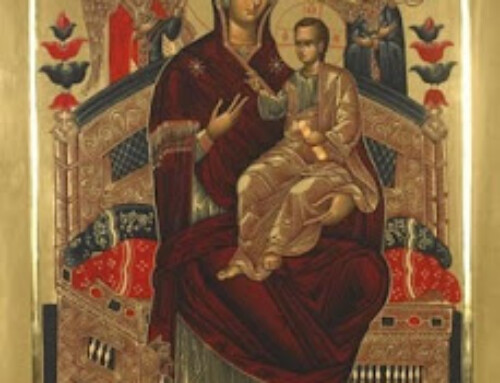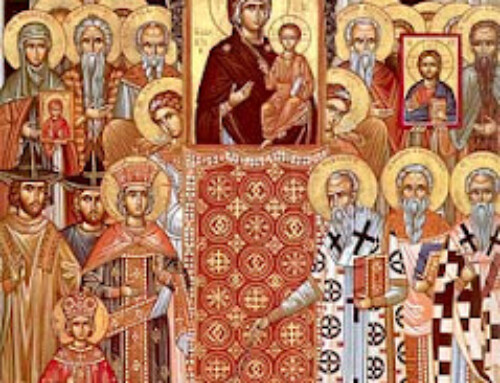Word Magazine January 1986 Page 17
WHY WE TEACH IN THE CHURCH
by Father Peter G. Rizos
The following is the second of four articles. Father Rizos is an Adjunct Instructor of Religious Education at Holy Cross Greek Orthodox Theological School.
Orthodox Christian education is the attempt by committed and trained Church members to awaken others to God’s presence and claim so that teacher and students together may be transformed into Christ-likeness. This definition of Orthodox Christian education lies at the heart of everything that will be discussed in the three articles to follow.
Three main points are taken up in this second article: (1) Why do we teach? (2) What is the aim of our teaching? (3) What is the meaning of our teaching in the Church?
Why Do We Teach?
The foremost reason why we teach in the Church is that Jesus Christ, “the leader and perfecter of our faith” (Hebrews 12:2), is the Teacher of us all. St. John writes in his First General Letter that “he who says he abides in Him (i.e. Jesus) ought to walk in the same way in which He walked” (I John 2:6). This applies not only to keeping the Lord’s commandments, but also teaching them to others.
One of the names by which the Lord is known and commonly addressed in the Gospels is “Teacher”. It seems that Jesus never lost the opportunity to teach others the Word.
Seldom have a teacher and his teachings been as closely connected as in the Person of Jesus Christ. In His teachings to the disciples, Jesus imparted to them Himself — His own life that He had in oneness with God: “Take ye, eat: This is My Body . . . Drink of it ye all: This is My Blood . . . “ This means that by His words and actions the Lord offers His whole Self to us in the communication of the faith. He wants to renew our oneness with Him not only through the teaching of His Word, but also through His living presence within us. The Lord gives Himself to us as He teaches.
People who love one another naturally want to be with and to learn more about the one they love. When we accept Jesus Christ as our personal Savior, He wants to live in us and we in Him (John 15:4-11). By teaching the faith we show a willingness to grow with others in the knowledge of the Lord and in the sense of His presence. We do this because we love Him, knowing that He has loved us first.
What we have said so far seems to suggest that Christian education is quite different from other kinds of teaching and learning. Christian education is unique because the content of our faith conveys God’s Self-revelation in Christ (John 6:68; 17:8; Acts 5:20; I Peter 1:25). When we speak of divine revelation, we do not mean a series of ideas or concepts placed alongside others to make neat theological formulas. Revelation means that God wants to make Himself known to man in a dynamic relationship of faith and loving obedience.
When we come to understand that the Lord wants to reveal Himself through our teaching, we sense the urgency of His call to continue and to expand upon His work in our time. The Great Commission given to the disciples before the Lord’s Ascension resounds in our hearts with the power of the Risen Lord: “Go. . . and make disciples of all nations . . . teaching them to observe all that I have commanded you; and lo, I am with you always, to the close of the age” (Matthew 28:19, 20).
What Is the Aim or Goal of Our Teaching?
Said briefly, the aim of the Church School is to assist in the saving mission of the Church by teaching the faith to believers. It is too easily forgotten, however, that the Lord’s commission to teach was directed to all the members of the Church (Matthew 28:19-20; Mark 16:15-16; Luke 24:47-48; Acts 1:8). Even though only certain members take on specific teaching assignments, the responsibility for teaching rests upon the whole Church. A parish that neglects the teaching function loses something that is indispensable to its nature as a church.
In very broad terms, our Church School teaching should mainly be concerned with the growth of eternal life within the students, with their development in the likeness of God who gives this life. The religious knowledge we impart to our pupils should contribute to their progressive transformation toward the character, values, motives, attitudes, and understandings of God as revealed in Christ (see Galatians 2:20). Our goal is growth in Christ-likeness through faith development (II Corinthians 3:18). The purpose of the Church School then should be to communicate and to nurture faith-as-life.
What Does It Mean That We Teach in the Church?
We all tend to think of Church School as a group of teachers, administrators, and students joined together by the organizational structure of classes, graded curricular materials, and role expectations. Taken up by our particular tasks on Sunday mornings, we lose sight of the sacramental reality of Christ’s body which unites us with the Lord and through Him with one another. The Body of Christ was formed that we might minister in love to one another’s growth in Christ (Ephesians 4:12-13). We grow in Christ’s life, individually and corporately, precisely as we serve one another and thus build up the Church (see I Thessalonians 5:11; Ephesians 4:12, 16, 19, 29; I Corinthians 14:4, 5, 12, 17). Each member of the Church is equipped by God to make this ministry to others possible.
As Church School teachers we need to get back the outlook of the early Church regarding the gifts or charismata of the Holy Spirit, of which teaching is one. St. Paul says very clearly that, “To each (i.e., member of the Church) is given the manifestation of the Spirit for the common good” (I Corinthians 12:7). And in his letter to the Ephesians, the Apostle Paul writes, “Grace was given to each of us according to the measure of Christ’s gift” (4:7). St. Paul puts teachers high up in the list of workers whom God has chosen to labor in the Church (see I Corinthians 12:27-31; Romans 12:6-8; Ephesians 4:11-12).
Orthodox Christian education is guided growth in divine life. The teaching ministry is at heart a relationship of love between the teacher and his students. This means that in the design and teaching of curricular materials we must provide guidelines for the communication of the faith in a person-to-person setting. We have been taken up too long with the content of our lessons, with how much information we want to transmit to our students, while ignoring the actual dynamics of the teaching-learning process in the classroom.
Church School is no substitute for the Divine Liturgy, just as informed worship “in Spirit and truth” (John 4:24) means that careful religious instruction is indispensable. We need to prepare our children to “pray with the spirit and … pray with the mind also,” to “sing with the spirit and sing with the mind also” (I Corinthians 14:15). Corporate worship, no less than religious instruction, need to be understood as points in the rhythm of withdrawal from the world for the purpose of ministry to the world. We need to help our students and teachers alike to grow in the understanding of the Divine Liturgy as a movement of God’s people to His Kingdom from which we bear the Light of Christ back into the world.




